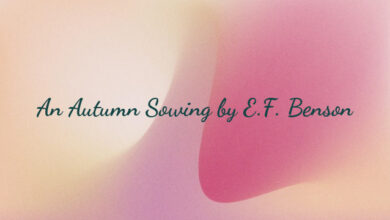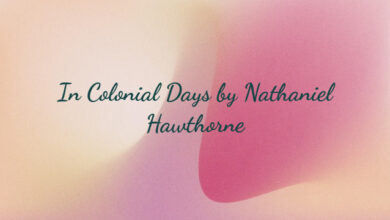
The Human Chord by Algernon Blackwood
Chapter 10
I
The first thing Spinrobin knew when he ran upstairs to lock away the money in his desk was that his whole being, without his directing it, asked a question of momentous import. He did not himself ask it deliberately. He surprised his sub-consciousness asking it:
“WHAT IS THIS NAME THAT PHILIP SKALE FOREVER SEEKS?”
It was no longer mere curiosity that asked it, but that sense of responsibility which in all men of principle and character lies at the root of action and of life. And Spinrobin, for all his little weaknesses, was a man of character and principle. There came a point when he could no longer follow blindly where others led, even though the leader were so grand an individual as Philip Skale. This point is reached at varying degrees of the moral thermometer, and but for the love that Miriam had wakened in his heart, it might have taken much longer to send the mercury of his will so high in so short a time. He now felt responsibility for two, and in the depths of his queer, confused, little mind stirred the thought that possibly after all the great adventure he sought was only the supreme adventure of a very wonderful Love.
He records these two questions at this point, and it is only just to himself, therefore, to set them down here. To neither was the answer yet forthcoming.
For some days the routine of this singular household followed its normal course, the only change being that while the secretary practiced his Hebrew names and studied the relations between sound, color, form and the rest, he kept himself a little better in hand, for Love is a mighty humanizer and holds down the nose upon the grindstone of the wholesome and practical values of existence. He turned, so to speak, and tried to face the matter squarely; to see the adventure as a whole; to get all round it and judge. It seems, however, that he was too much in the thick of it to get that bird’s-eye view which reduces details to the right proportion. Skale’s personality was too close, and flooded him too violently. Spinrobin remained confused and bewildered; but also unbelievably happy.
“Coming out all right,” he wrote shakily in that gilt-edged diary. “Beginning to understand why I’m in the world. Am just as important as anybody else–really. Impossible explain more.” His entries were very like telegrams, in which a man attempts to express in a lucid shorthand all manner of things that the actual words hardly compass. And life itself is not unlike some mighty telegram that seeks vainly to express, between the extremes of silence and excess, all that the soul would say….
“Skale is going too far,” perhaps best expresses the daily burden of his accumulating apprehension. “He is leading up to something that makes me shrink–something not quite legitimate. Playing with an Olympian fire that may consume us both.” And there his telegram stopped; for how in the world could he put into mere language the pain and distress involved in the thought that it might at the same time consume Miriam? It all touched appalling depths of awe in his soul. It made his heart shake. The girl had become a part of his very self.
Vivid reactions he suffered, alternating with equally vivid enthusiasms. He realized how visionary the clergyman’s poetical talk was, but the next minute the practical results staggered him again, as it were, back into a state of conviction. For the poetry obscured his judgment and fired his imagination so that he could not follow calmly. The feeling that it was not only illogical but insane troubled him; yet the physical effects stared him in the face, and to argue with physical results is waste of time. One must act.
Yet how “act?” The only way that offered he accepted: he fell back upon the habits of his boyhood, read his Bible, and at night dropped humbly upon his knees and prayed.
“Keep me straight and pure and simple, and bless … Miriam. Grant that I may love and strengthen her … and that my love may bring her peace … and joy …and guide me through all this terror, I beseech Thee, into Truth….”
For, in the beauty of his selfless love, he dared not even admit that it was love; feeling only the highest, he could not quite correlate his sweet and elevated passion with the common standards of what the World called love. The humility of a great love is ever amazing.
And then followed in his prayers the more cowardly cry for ordinary protection from the possible results of Skale’s audacity. The Love of God he could understand, but the Wrath of God was a conception he was still unemancipated enough to dread; and a dark, portentous terror that Skale might incur it, and that he might be dragged at its heels into some hideous catastrophe, chased him through the days and nights. It all seemed so unlawful, impious, blasphemous….
“… And preserve us from vain presumptions of the heart and brain, I pray Thee, lest we be consumed…. Please, O God, forgive the insolence of our wills … and the ignorant daring of our spirit…. Permit not the innocent to suffer for the guilty … and especially bless … Miriam….”
Yet through it all ran that exquisite memory of the calling of his true name in the spaces of his soul. The beauty of far-off unattainable things hovered like a star above his head, so that he went about the house with an insatiable yearning in his heart, a perpetual smile of wonder upon his face, and in his eyes a gleam that was sometimes terror, sometimes delight.
It was almost as if some great voice called to him from the mountaintops, and the little chap was forever answering in his heart, “I’m coming! I’m coming!” and then losing his way purposely, or hiding behind bushes on the way for fear of meeting the great invisible Caller face to face.II
And, meanwhile, the house became for him a kind of Sound-Temple as it were, protected from desecration by the hills and desolate spaces that surrounded it. From dawn to darkness its halls and corridors echoed with the singing violin, Skale’s booming voice, Miriam’s gentle tones, and his own plaintive yet excited note, while outside the old grey walls the air was ever alive with the sighing of the winds and the ceaseless murmur of falling water. Even at night the place was not silent. He understood at last what the clergyman had told him–that perfect silence does not exist. The universe, down to its smallest detail, sings through every second of time.
The sounds of nature especially haunted him. He never heard the wind now without thinking of lost whispers from the voice of God that had strayed down upon the world to sweeten and bewilder the hearts of men–whispers a-search for listeners simple enough to understand. And when their walks took them as far as the sea, the dirge of the waves troubled his soul with a kind of distressing exaltation that afflicted the very deeps of his being. It was with a new comprehension he understood his employer’s dictum that the keynote of external nature was middle F–this employer who himself possessed that psychic sense of absolute pitch–and that the roar of a city, wind in forest trees, the cry of trains, the rushing of rivers and falling water, Niagara itself, all produced this single utterance; and he loved to sing it on the moors, Miriam laughing by his side, and to realize that the world, literally, sang with them.
Behind all sounds he divined for the first time a majesty that appalled; his imagination, glorified by Skale, instantly fell to constructing the forms they bodied forth. Out of doors the flutes of Pan cried to him to dance: indoors the echoes of yet greater music whispered in the penetralia of his spirit that he should cry. In this extraordinary new world of Philip Skale’s revelation he fairly spun.
It was one thing when the protective presence of the clergyman was about him, or when he was sustained by the excitement of enthusiasm, but when he was alone, at his normal level, timid, yet adventurous, the too vivid sense of these new things made him tremble. The terrifying beauty of Skale’s ideas; the realization in cold blood that all forms in the world about him were silently a-singing, and might any moment vanish and release their huge bodies into primal sounds; that the stones in the road, the peaked hills, the very earth herself might alter in shape before his eyes: on the other hand, that the viewless forces of life and death might leap into visibility and form with the calling of their names; that himself, and Skale, and Mrs. Mawle, and that pale fairy girl-figure were all enmeshed in the same scheme with plants, insects, animals and planets; and that God’s voice was everywhere too sublimely close–all this, when he was alone, oppressed him with a sense of things that were too intimate and too mighty for daily life.
In these moments–so frequent now as to be almost continuous–he preferred the safety of his ordinary and normal existence, dull though it might be; the limited personality he had been so anxious to escape from seemed wondrous sweet and comforting. The Terror of the approaching Experiment with this mighty name appalled him.
The forces, thus battling within his soul, became more and more contradictory and confused. The outcome for himself seemed to be the result of the least little pressure this way or that–possibly at the very last moment, too. Which way the waiting Climax might draw him was a question impossible to decide.III
And then, suddenly, the whole portentous business moved a sharp stage nearer that hidden climax, when one afternoon Mr. Skale came up unexpectedly behind him and laid a great hand upon his shoulder in a way that made him positively jump.
“Spinrobin,” he said, in those masterful, resonant tones that shamed his timidity and cowardice, “are you ready?”
“For anything and everything,” was the immediate reply, given almost automatically as he felt the clergyman’s forces flood into his soul and lift him.
“The time is at hand, then,” continued the other, leading his companion by the arm to a deep leather sofa, “for you to know certain things that for your own safety and ours, I was obliged to keep hidden till now–first among which is the fact that this house is not, as you supposed, empty.”
Prepared as he was for some surprising announcement, Spinrobin nevertheless started. It was so abrupt.
“Not empty!” he repeated, eager to hear more, yet quaking. He had never forgotten the nightly sounds and steps in his own passage.
“The rooms beyond your own,” said Skale, with a solemnity that amounted to reverence, “are occupied–“
“By–” gasped the secretary.
“Captured Sounds–gigantic,” was the reply, uttered almost below the breath.
The two men looked steadily at one another for the space of several seconds, Spinrobin charged to the brim with anxious questions pressing somehow upon the fringe of life and death, Skale obviously calculating how much he might reveal or how little.
“Mr. Spinrobin,” he said presently, holding him firmly with his eyes, “you are aware by this time that what I seek is the correct pronunciation of certain names–of a certain name, let us say, and that so complex is the nature of this name that no single voice can utter it. I need a chord, a human chord of four voices.”
Spinrobin bowed.
“After years of research and experiment,” resumed the clergyman, “I have found the first three notes, and now, in your own person, has come my supreme happiness in the discovery of the fourth. What I now wish you to know, though I cannot expect you to understand it all at first, is that the name I seek is broken up into four great divisions of sound, and that to each of these separate divisions the four notes of our chord form introductory channels. When the time comes to utter it, each one of us will call the syllable or sound that awakens the mighty response in one of these immense and terrific divisions, so that the whole name will vibrate as a single chord sung perfectly in tune.”
Mr. Skale paused and drew deep breaths. This approach to his great experiment, even in speech, seemed to exhaust him so that he was obliged to call upon reserves of force that lay beneath. His whole manner betrayed the gravity, the reverence, the mingled respect and excitement of–death.
And the simple truth is that at the moment Spinrobin could not find in himself sufficient courage to ask what this fearful and prodigious name might be. Even to put ordinary questions about the four rooms was a little beyond him, for his heart beat like a hammer against his ribs, and he heard its ominous drum sounding through both his temples.
“And in each of the rooms in your corridor, ready to leap forth when called, lie the sounds or voices I have captured and imprisoned, these separate chambers being sheeted and prepared–huge wax receptacles, in fact, akin to the cylinders of the phonograph. Together with the form or pattern belonging to them, and the color, there they lie at present in silence and invisibility, just as the universe lay in silence and invisibility before the word of God called it into objective being. But–know them and they are mine.”
“All these weeks–so close to me,” whispered Spinrobin, too low for Skale to notice.
Then the clergyman leaned over towards him. “These captured sounds are as yet by no means complete,” he said through his beard, as though afraid to admit it; “for all I have of them really is their initial letters, of their forms the merest faint outlines, and of their colors but a first suggestion. And we must be careful, we must be absolutely wise. To utter them correctly will mean to transfer to us the qualities of Gods, whereas to utter falsely may mean to release upon the surface of the world forces that–” He shrugged his great shoulders and an ashen pallor spread downwards over the face to the very lips. The sentence remained unfinished; and its very incompleteness left Spinrobin with the most grievous agony of apprehension he had yet experienced.
“So that, if you are ready, our next step shall be to show you the room in which your own particular sound lies,” added Mr. Skale after a long pause; “the sound in the chord it will be your privilege to utter when the time comes. For each of us will utter his or her particular letter, the four together making up the first syllable in the name I seek.”
Mr. Skale looked steadily down into the wide blue eyes of his companion, and for some minutes neither of them spoke.
“The letter I am to utter,” repeated the secretary at length; “the letter in some great name?”
Mr. Skale smiled upon him with the mighty triumph of the Promethean idea in his eyes.
“The room,” he muttered deeply and softly, “in which it lies waiting for you to claim it at the appointed time … the room where you shall learn its color, become attuned to its great vibratory activity, see its form, and know its power in your own person.”
Again they looked long into one another’s eyes.
“I’m game,” murmured Spinrobin almost inaudibly; “I’m game, Mr. Skale.” But, as he said it, something in his round head turned dizzy, while his thoughts flew to Miriam and to the clergyman’s significant phrase of a few minutes ago–“we must be careful, we must be absolutely wise.”IV
And the preparation the clergyman insisted upon–detailed, thorough and scrupulous–certainly did not lessen in Spinrobin’s eyes the gravity of the approaching ordeal. They spent two days and nights in the very precise and punctilious study, and utterance, of the Hebrew names of the “angels”–that is, forces–whose qualities were essential to their safety.
Also, at the same time, they fasted.
But when the time came for the formal visit to those closed rooms, of which the locked doors were like veils in a temple, Spinrobin declares it made him think of some solemn procession down ancient passageways of crypt or pyramid to the hidden places where inscrutable secrets lay. It was certainly thrilling and impressive. Skale went first, moving slowly with big strides, grave as death, and so profoundly convinced of the momentous nature of their errand that an air of dignity, and of dark adventure almost majestic, hung about his figure. The long corridor, that dreary December morning, stretched into a world of shadows, and about half-way down it he halted in front of a door next but one to Spinrobin’s room and turned towards his companion.
Spinrobin, in a mood to see anything, yet striving to hide behind one of those “bushes,” as it were, kept his distance a little, but Mr. Skale took him by the arm and drew him forward to his side. Slowly he stooped, till the great bearded lips were level with his ear, and whispered solemnly:
“Blessed are the pure in heart, for they shall see–and hear God.”
Then he turned the key and led the way inside.
But apparently there were double doors, for they found themselves at first in a cupboard-like space that formed a tiny vestibule to the room itself; and here there was light enough to see that the clergyman was taking from nails on the wall two long garments like surplices, colored, so far as Spinrobin could make out, a deep red and a deep violet.
“For our protection,” whispered Skale, enveloping himself in the red one, while he handed the other to his companion and helped him into it. “Wear it closely about your body until we come out.” And while the secretary struggled among the folds of this cassock-like garment, that was several feet too long for his diminutive stature, the clergyman added, still with a gravity and earnestness that impressed the imagination beyond all reach of the ludicrous:
“For sound and color are intimately associated, and there are combinations of the two that can throw the spiritual body into a condition of safe receptivity, without which we should be deaf and blind even in the great Presences themselves.”
Trivial details, presenting themselves in really dramatic moments, may impress the mind with extraordinary aptness. At this very moment Spinrobin’s eyes noticed in the corner of wall and door a tiny spider’s web, with the spider itself hanging in the center of its little net–shaking. And he has never forgotten it. It expressed pictorially exactly what he felt himself. He, too, felt that he was shaking in midair–as in the center of a web whose strands hung suspended from the very stars.
And the words, spoken in that slow deep whisper, filled the little space in which the two men stood, and somehow completed for Spinrobin the sense of stupendous things adequately approached.
Then Mr. Skale closed the outer door, shutting out the last feeble glimmer of day, at the same moment turning the handle of the portal beyond. And as they entered the darkness, Spinrobin, holding up his violet robe with one hand to prevent tripping, with the other caught hold of the tail of the flowing garment in front of him. For a second or two he stopped breathing altogether.V
On the very threshold a soft murmur of beauty met them; and, as plainly as though the darkness had lifted into a blaze of light, the secretary at once realized that he stood in the presence of something greater than all he had hitherto known in this world. He had managed to find the clergyman’s big hand, and he held it tightly through a twisted corner of his voluminous robe. The inner door next closed behind them. Skale, he was aware, had again stooped in the darkness to the level of his ear.
“I’ll give you the sound–the note,” he heard him whisper. “Utter it inwardly–in your thoughts only. Its vibrations correspond to the color, and will protect us.”
“Protect us?” gasped Spinrobin with dry lips.
“From being shattered and destroyed–owing to the intense activity of the vibrations conveyed to our ultimate physical atoms,” was the whispered reply, as the clergyman proceeded to give him under his breath a one-syllable sound that was unlike any word he knew, and that for the life of him he has never been able to reproduce since.
Mr. Skale straightened himself up again and Spinrobin pictured him standing there twice his natural size, a huge and impressive figure as he had once before seen him, clothed now with the double dignity of his strange knowledge. Then, advancing slowly to the center of the room, they stood still, each uttering silently in his thoughts the syllable that attuned their inner beings to safety.
Almost immediately, as the seconds passed, the secretary became aware that the room was beginning to shake with a powerful but regular movement. All about him had become alive. Vitality, like the vitality of youth upon mountain tops, pulsed and whirled about them, pouring into them the currents of a rushing glorious life, undiluted, straight from the source. In his little person he felt both the keenness of sharp steel and the vast momentum of a whole ocean. Thus he describes it. And the more clearly he uttered in his thoughts the sound given to him by his leader, the greater seemed the influx of strength and glory into his heart.
The darkness, meanwhile, began to lift. It moved upwards in spirals that, as they rose, hummed and sang. A soft blaze of violet like the color of the robe he wore became faintly visible in the air. The chamber, he perceived, was about the same size as his own bedroom, and empty of all furniture, while walls, floor, and ceiling were draped in the same shade of violet that covered his shoulders; and the sound he uttered, and thought, called forth the color and made it swim into visibility. The walls and ceiling sheeted with wax opened, so to speak, their giant lips.
Mr. Skale made a movement and drew him closer. He raised one arm into the air, and Spinrobin, following the motion, saw what at first he imagined to be vast round faces glimmering overhead, outlined darkly against the violet atmosphere. Mr. Skale, with what seemed a horrible audacity, was reaching up to touch them, and as he did so there issued a low, soft, metallic sound, humming and melodious, that dropped sweetly about his ears. Then the secretary saw that they were discs of metal–immense gongs swinging in midair, suspended in some way from the ceiling, and each one as Skale touched it emitted its beautiful note till all combined together at length into a single chord.
And this chord, though Spinrobin talks whole pages in describing it, apparently brought in its train the swell and thunder of something beyond,–the far sweetness of exquisite harmonics, thousands upon thousands, inwoven with the strands of deeper notes that boomed with colossal vibrations about them. And, in some fashion that musical people will understand, its gentler notes caught up the sound that Spinrobin was uttering in his mind, and took possession of it. They merged. An extraordinary volume, suggesting a huge aggregation of sound behind it–in the same way that a murmur of wind may suggest the roar of tempests–rose and fell through the room, lifted them up, bore them away, sang majestically over their heads, under their feet, and through their very minds. The vibrations of their own physical atoms fell into pace with these other spiritual activities by a kind of sympathetic resonance.
The combination of power and simplicity was what impressed him most, it seems, for it resembled–resembled only–the great spiritual simplicity in Beethoven that rouses and at the same time satisfies the profoundest yearnings of the soul. It swept him into utter bliss, into something for once complete. And Spinrobin, at the center of his glorified yet quaking little heart, understood vaguely that the sound he uttered, and the sound he heard, were directly connected with the presence of some august and awful Name….VI
Suddenly Mr. Skale, he was aware, became rigid beside him. Spinrobin pressed closer, seeking the protective warmth of his body, and realizing from the gesture that something new was about to happen. And something did happen, though not precisely in the sense that things happen in the streets and in the markets of men. In the sphere of his mind, perhaps, it happened, but was none the less real for that.
For the Presence he had been aware of in the room from the moment of entrance became then suddenly almost concrete. It came closer–sheeted in wonder inscrutable. The form and body of the sounds that filled the air pressed forward into partial visibility. Spinrobin’s powers of interior sight, he dimly realized, increased at the same time. Vast as a mountain, as a whole range of mountains; beautiful as a star, as a whole heaven of stars; yet simple as a flower of the field; and singing this little song of pure glory and joy that he felt was the inmost message of the chord–this Presence in the room sought to push forward into objective reality. And behind it, he knew, lay the stupendous urgency and drive of some power that held the entire universe in its pulses as easily as the ocean holds a shoal of minnows….
But the limits of realization for him were almost reached. Spinrobin wanted to close his eyes, yet could not. He was driven along with the wave of sound thus awakened and forced to see what was to be seen. This time there was no bush behind which he could screen himself. And there, dimly sketched out of the rhythmical vibrations of the seething violet obscurity, rose that looming Outline of wonder and majesty that clothed itself about them with a garment as of visible sound. The Unknown, suggesting incredible dimensions, stood at his elbow, tremendously draped in these dim, voluminous folds of music and color–very fearful, very seductive, yet so supremely simple at the same time that a little child could have understood without fear.
But only partially there, only partially revealed. The ineffable glory was never quite told. Spinrobin, amid all the torrent of words in which he sought later to describe the experience, could only falter out a single comprehensible sentence: “I felt like stammering in intoxication over the first letter of a name I loved–loved to the point of ecstasy–to the point even of giving up my life for it.”
And meanwhile, breathless and shaking, he clung to Skale, still murmuring in his heart the magic syllable, but swept into some region of glory where pain and joy both ceased, where terror and delight merged into some perfectly simple form of love, and where he became in an instant of time an entirely new and emancipated Spinrobin, driving at full speed towards the ultimate sound and secret of the universe–God.
He never remembered exactly how he got out of the room, but it always seemed as though he dropped with a crash from some enormous height. The sounds ceased; the gongs died into silence; the violet faded; the quivering wax lay still…. Mr. Skale was moving beside him, and the next minute they were in the narrow vestibule between the doors, hanging up ordinary colored surplices upon ordinary iron nails.
Spinrobin stumbled. Skale caught him. They were in the corridor again–cold, cheerless, full of December murk and shadows–and the secretary was leaning against the clergyman’s shoulder breathless and trembling as though he had run a mile.




